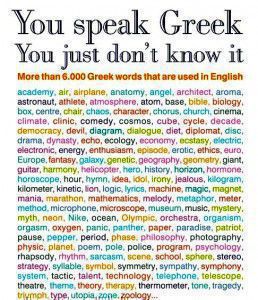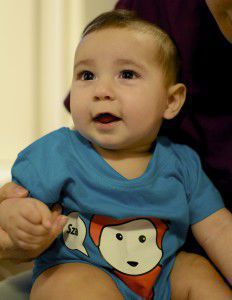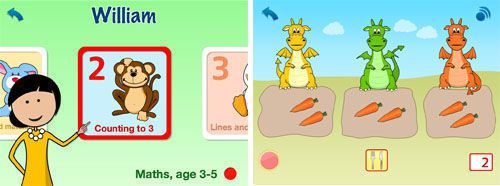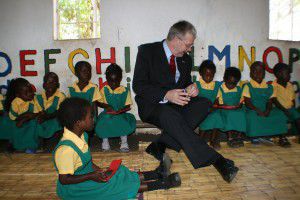Do you know who you’re talking to?
Our post today is by Izabella Klein, who’s been working with us to translate our maths apps into Brazilian Portuguese. Izabella’s post is about the importance of getting to know your target audience as a translator, and understanding more than just the words used.
Have you ever read an article, document or webpage in your own language that you can clearly see has been translated from another language? The sentences don’t really make sense, or have wordings that are not commonly used where you come from or where it’s been published. Do you get bored or lose interest because of this? I would say most likely yes!
There are two main reasons for this. One, it has been translated by a translation device. Or two, it has been translated by real people, but they were not careful to take into consideration the target public – you.
Reason number one I will disregard, because I strongly do not recommend this option for translation. But let’s go a bit deeper into reason number two, and look at why many translations are not handled carefully, to catch the attention of the readers, or even just make them understandable.
Let’s take the English language as an example. How many different countries in the world speak English as a first language? USA, England, Australia, some of Canada, some of Africa and even more. But, although it is all English, each one of them has a particular way of communicating; they use different words, they have different local parlance, slang and so on. Spanish is another language spoken worldwide as a first language; take Spain, Argentina, Colombia, Mexico, Chile, Peru, Venezuela and Ecuador for example. And even if we talk specifically about Spain, they still have other variations, such as Catalan and Galician.
So, even if someone is fluent in a specific language, that doesn’t mean they are capable of translating perfectly to that language in any place in the world where this is the native language. You must understand the minimum of their culture, their slang, and how they usually communicate something that you are interested in communicating to them.
I’ll take myself as an example. I’ve been working for Japanese people for the last couple of years as a linguist, using Portuguese and English as source and target languages. In the beginning it was a hard task. Much of what was said or written to me was difficult to understand: their awkward accent, the different words they used (words that are in the dictionary, but I’d never really heard people saying them on a daily basis), or incomplete sentences. So I had to get used to their weird English sentences, sometimes just random words that I had to put together like a puzzle and figure out the missing words. But, in the end, it was just a matter of adapting to their culture, or to JapanEnglish as I call it. Now, I feel 100% confident while working with them. I had to spend a year studing their different habits, and basically dig a way into making myself understandable in their language, in this case JapanEnglish.
You might say JapanEnglish is not really a language, but I argue that it is. It’s just a mixture of Japanese and English, the same way Catalan is a mixture of Spanish and French; and Galician a mixture of Spanish and Portuguese. The only difference is JapanEnglish is not an official language. My point here is that it’s important to realise why you must get to know your target public as deeply as possible, so that your translation work will be accurate.
I can also take my internship at EuroTalk as a second example of my work experience. I worked in app localisation, focused on teaching maths to very young children. Some might say it must have been an easy task. But actually it was not that easy. Children are different from adults, they use different vocabulary and they can easily get distracted. Plus, you can’t use a completely different vocabulary than teachers use at school, because the main idea is to reinforce what they will learn or are already learning at school; otherwise you might just confuse them, which will mean unhappy children and parents.
I know that for most linguists time is money, as it is for most people, but a piece of advice from what I have learned during my career is, take some time and effort to study your market. I believe that if you do, your chances of boosting your career are greater.
Izabella
So, did you know you can speak Greek?
Today’s blog post is written by Konstantia Sotiropoulou, who’s been helping us to translate and record our Maths apps in Greek.
I bumped into the picture below a while ago and I thought this should be interesting. Undoubtedly, Greek is one of the richest languages in the world and is distinguished by an extensive vocabulary. In the past, the Guinness Book of Records ranked the Greek language as the richest in the world with 5 million words and 70 million word types!

The front cover of You speak Greek, You just don't know it, a book by Annie Stefanides (Ianos, 2010)
Well, many of these words have been widely borrowed into other languages, including English. Greek roots are often used to coin new words for other languages, especially in the sciences and medicine. Mathematics, physics, astronomy, democracy, philosophy, athletics, theatre, rhetoric, baptism and hundreds of other words are Greek. Moreover, Greek words and word elements continue to be productive as a basis for coinages: anthropology, photography, telephony, isomer, biomechanics, cinematography, etc. and form, with Latin words, the foundation of international scientific and technical vocabulary, e.g. all words ending with –logy (“discourse”). Interestingly, an estimated 12% of the English vocabulary has Greek origin. Greek has contributed to English in several ways, including direct borrowings from Greek and indirectly through other languages (mainly Latin or French).
In a typical 80,000-word English dictionary, about 5% of the words are directly borrowed from Greek; this is about equivalent to the vocabulary of an educated speaker of English (for example, “phenomenon” is a Greek word and even obeys Greek grammar rules as the plural is “phenomena”). However, around 25% are borrowed indirectly. This is because there were many Greek words borrowed in Latin originally, which then filtered down into English because English borrowed so many words from Latin (for example, “elaiwa” in Greek evolved into the Latin “oliva”, which in turn became “olive” in English).
Greek and Latin are the predominant sources of the international scientific vocabulary. Greek is often used in coining very specialized technical or scientific words, however, so the percentage of words borrowed from Greek rises much higher when considering highly scientific vocabulary (for example, “oxytetracycline” is a medical term that has several Greek roots).
In education, an excellent way to build vocabulary is teaching students how to find roots in words. Since many words have their base in the Greek language, beginning with the roots from this ancient language is a good place to start. This list of English words with Greek origin will give students a basis for further exploration into the roots of the English language.
Now you that you have seen how many Greek words you know, I am going to teach you some more common ones like “kalimera” which means “good morning”, “Ya sou” which means “hi”, “Me lene” which means “my name is” and “efharisto” which means “thank you”. And if you are interested in learning more and discovering how many you already know, try EuroTalk’s uTalk Greek app.
And who am I to be talking about the Greek language? I am the Greek intern of EuroTalk, who translated and recorded into Greek their new Maths apps for young children. An interesting and fun experience for a young translator like me. I have to say that I really enjoyed working in this office, which gives you the sense of a family home. People here are calm and friendly, the kitchen is fully equipped with all kinds of snacks and during the day we get to listen to nice music while working! How amazing is that?
I started towards the end of January by translating the scripts of the app and soon after I recorded the first topics. I caught myself playing the app more than I needed to, as the games are really fun! I am sure young kids will truly enjoy it while learning basic Mathematics rules. And I know that my three-year-old niece, who will be playing the app in a few weeks, will at least have a constructive and educational first contact with technology!
So, whether you want to take up a new language or help your child have a nice start with Maths, you know that EuroTalk is here for you!
* There is an interesting video on YouTube that explains the History of English and the influence that it had from other languages!
Konstantia
A Year in the Life of EuroTalk
There’s no doubt 2012 has been a pretty special year for the UK and the world, but it’s also been quite an eventful one at EuroTalk.
Maths
In January we released a new app, the first in a series to teach maths to primary school age children.
![]()
This is a part of our mission to reach a billion children with fantastic educational apps, to get them off to a great start in life. The most exciting thing about the apps is that we’ll be translating them into 200 languages so they can literally be used by any child, anywhere.
Maths, age 3-5 was an instant hit with parents and children all over the world, and we were delighted with the response. Ever since then we’ve been working hard on the next app, for 4-6 year olds, which has just this week been released to the App Store. The whole series will cover all the years of primary school and we’re really excited about the future!
Malawi
Our work in Malawi has continued this year. In February, Andrew, Jamie, Zane, Alan and RoseMarie, who’s the author of the maths apps, travelled to Malawi to install iPods with the app translated into the local language of Chichewa, in primary schools. They also trained teachers and pupils on how to use the devices. The project is being run in partnership with the Scottish government, and last month Andrew and Jamie returned to Malawi, where they met with Michael Russell, the Scottish Education Secretary. He was delighted with the project so far, which has been declared a success!
Languages
We’ve also been really busy with our language learning programs. In October we released Talk More, Talk the Talk and Talk Business as downloads, as well as the Instant USB, which combines Talk Now and Talk More on one handy and portable USB drive, so it works with all the new computers that don’t have CD drives.
Baby boom!

This year, Zsolt, Olga and Chelsey all welcomed new babies – and brought them in to the office so we could all have a cuddle! Zsolt’s little boy Barnie even became the new ‘face of EuroTalk’ for a while when we posted this photo on our Facebook page.
Arrivals and departures
Sadly over the year we’ve had to say goodbye to a few people as Lotta, Ryan, Katie and Sheila all moved on to new challenges. But we also welcomed some new team members: Fiona, who looks after all our customers (and us) brilliantly; Pedro and Michal, our new app developers; Nat and Alex, who are busy getting our new products translated into hundreds of languages; and Tom, who’s only with us for a year but is already a hugely valued member of the team, helping with customer orders and product testing among many other tasks.
Marathon men – and woman
In October, Al, Franco, Glyn, Jamie, Zane and Zsolt all ran the Royal Parks Foundation Half Marathon in London in aid of some great charities. They all worked really hard training, and of course on the day itself, and are already talking about taking part again next year…
And that’s all for 2012! But we’ll be back in 2013 with more plans and exciting new products. Thanks for reading our blog this year, and we look forward to bringing you more news, opinions and guest posts next year! And as always if you have anything you’d like to share, do get in touch.
Have a great Christmas and New Year, everyone!
Liz and the EuroTalk team



